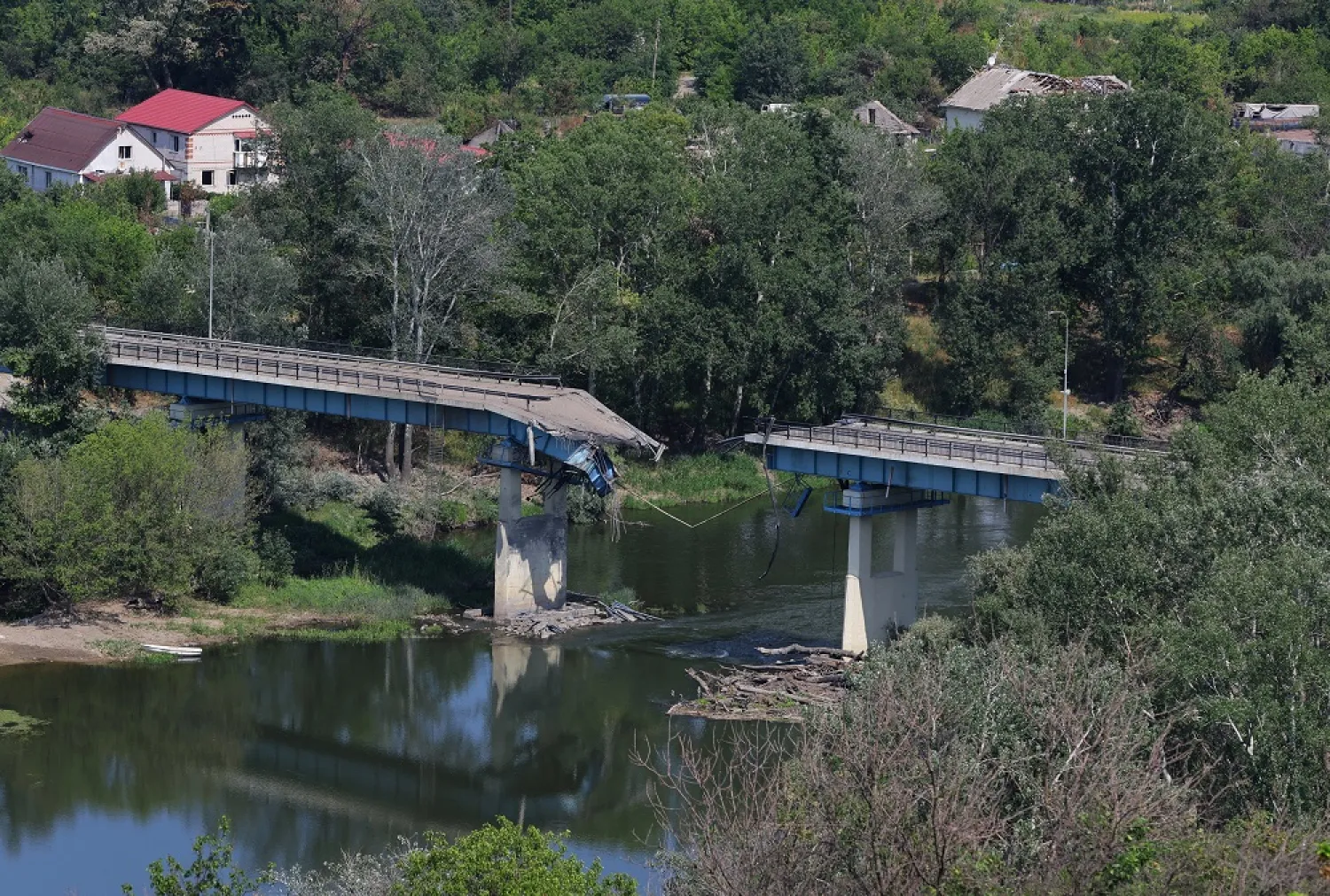Russian forces struck targets across Ukraine's eastern Donetsk region on Tuesday, a day after President Vladimir Putin declared victory in the neighboring region of Luhansk after months of grueling attritional warfare in which both sides lost many men.
The strikes across Donetsk, reported by regional officials and Russia's military, followed Moscow's capture of Lysychansk on Sunday, the last bastion of Ukrainian resistance in Luhansk.
Donetsk and Luhansk together make up the Donbas, the industrialized eastern part of Ukraine that has seen the biggest battle in Europe for generations. Russia says it wants to wrest control of the entire Donbas from Ukraine on behalf of Moscow-backed separatists in two self-proclaimed people's republics.
Ukrainian troops who retreated from Lysychansk at the weekend took up defensive lines in the Donetsk area on Tuesday, according to Serhiy Gaidai, governor of the Luhansk region.
Russian forces struck a market and a residential area in the city of Sloviansk in Donetsk on Tuesday, killing at least two people and injuring seven, local officials said.
A Reuters reporter on the scene saw yellow smoke billowing from an auto supplies shop, and flames engulfing rows of market stalls as firefighters tried to extinguish the blaze.
"Russians again deliberately target areas where civilians congregate," Donetsk regional governor Pavlo Kyrylenko wrote in a Facebook post that detailed the toll of Tuesday's strikes. "This is sheer terrorism."
Earlier, Kyrylenko had said both Sloviansk and nearby Kramatorsk had suffered heavy shelling overnight. "They are now also the main line of assault for the enemy," he said. "There is no safe place without shelling in the Donetsk region."
Russia’s ‘last victory’
The Russian defense ministry, which says it does not target residential areas, said it had used high-precision weapons to destroy command centers and artillery in the Donetsk region, where Ukraine still controls a number of major cities.
British Prime Minister Boris Johnson told President Volodymyr Zelenskiy during a call on Tuesday that he believed Ukraine's military could retake territory recently captured by Russian forces.
Johnson updated Zelenskiy on the latest deliveries of British military equipment, including 10 self-propelled artillery systems and loitering munitions, which would be arriving in the coming days and weeks, a spokesperson said.
Zelenskiy adviser Oleksiy Arestovych said Russia's capture of Lysychansk and Sievierodonetsk - two medium-sized cities in Luhansk, now largely reduced to ruins - had come at a heavy human and financial cost for Moscow and had taken 90 days.
"This is the last victory for Russia on Ukrainian territory," Arestovych said in a video posted online.
He said that besides the battle for Donetsk, Ukraine was hoping to launch counter-offensives in the south of the country. Russia might struggle to redirect its forces there with 60% of them now concentrated in the east, he said.
"And there are no more forces that can be brought in from Russia," Arestovych added.
Putin has told troops involved in capturing Luhansk - who would also be part of any attempt to capture cities in Donetsk - to "rest and recover their military preparedness", while units in other parts of Ukraine keep fighting.
A Reuters reporter who visited Lysychansk on Monday found widespread destruction and few residents in a city that was once home to nearly 100,000 people.
Those who were left surveyed bullet-riddled, up-ended Ukrainian police cars, hulking local government buildings scorched by shell fire and the damaged golden dome of an Orthodox church.
‘Enormous cost’
Some military experts reckoned the hard-fought victory had brought Russian forces little strategic gain, and the outcome of the war remained in the balance.
"I think it's a tactical victory for Russia but at an enormous cost," said Neil Melvin of the RUSI think tank in London.
Melvin said the decisive battle for Ukraine was likely to be fought not in the east, where Russia is mounting its main assault, but in the south, where Kyiv has begun a counter-offensive to recapture territory around the city of Kherson.
"There are counter-attacks beginning there and I think it's most likely that we'll see the momentum swing to Ukraine as it tries to then mount a large-scale counter-offensive to push the Russians back," he said.
Ukrainian air defenses intercepted and destroyed three missiles fired by Russia's air force on Tuesday at Ukraine's western Black Sea ports of Ochakov and Chernomorsk, said Serhiy Bratchuk, spokesman for the Odesa regional administration.
Earlier, Russian rockets hit Mykolaiv, a southern city on the main highway between Kherson and Odesa, according to its mayor, Oleksandr Senkevych.
Reuters could not independently verify the reports.
Russia's invasion has killed thousands, displaced millions and flattened cities, particularly in Russian-speaking areas in the east and southeast of Ukraine. It has also driven up global energy and food prices and raised fears of famine in poorer countries as Ukraine and Russia are both major grain producers.
A senior Ukrainian official, Rostyslav Shurma, urged Western nations on Tuesday to do more to help unblock Ukraine's Black Sea ports to release grain and metal exports. Ukraine's economy, he said, had shrunk by 30-40% since the war began on Feb. 24.
Addressing the UN Human Rights Council in Geneva, Ukraine's deputy foreign minister Emine Dzhaparova said: "If the Russian blockade of Ukraine's harbors of Odesa and Mykolaiv continues, millions of tons of food may rot in silos and tens of millions of people in Africa and Asia may starve."
At the same forum, UN human rights chief Michelle Bachelet said arbitrary detention of civilians had become "widespread" in parts of Ukraine held by Russia's military and affiliated armed groups, with 270 cases documented.
Kyiv and the West say Russia is waging an unprovoked, imperial-style land grab in its fellow ex-Soviet republic, and accuse Moscow of war crimes. Moscow denies that and calls its actions a "special military operation" to degrade Ukraine's military, root out dangerous nationalists in power and protect Russian speakers from Ukraine.









